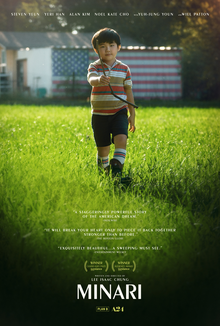Building life, farm, and family: Lee Isaac Chung’s ‘Minari’
March 3, 2021

I didn’t watch Minari in theaters; my ticket was for an A24 virtual cinema screening. I connected my laptop to a TV, sat down on the couch, and watched it in a darkened room. The stream froze once or twice. It’s an old TV, so the colors weren’t always right. But there was nevertheless something special, something intimate about this viewing experience. Before the screening began, a slideshow of old photographs played alongside clips from the film, photographs from the childhood of Lee Isaac Chung: Minari’s writer and director. He draws from his own life to tell the thoughtful, unpretentious story, but the film is more than memoir. Edited by Harry Yoon, ‘93, Minari is a contemplative, poetic portrait of family.
The film centers around the Korean/American Yi family — Monica (Han Ye-ri), her husband Jacob (Steven Yeun), their daughter Anne (Noel Kate Cho) and son David (Alan Kim), and the children’s maternal grandmother Soon-ja (Youn Yuh-jung) — as they, along with the crops in Jacob’s farm, struggle to take root in new, unfamiliar soil. When the film opens, Jacob leads his family from California to their new home in Arkansas. There, he dreams of starting a farm, growing and selling Korean produce. When they arrive at their new home, a mobile lifted off its wheels by cinder blocks, he reaches his hand out to help Monica climb inside. She isn’t sure that she can call this place home. Jacob thinks of himself as a kind of iconoclast and is determined to prove he is a capable patriarch. Early on, he rejects the advice of the locals who dowse to find water. He finds his own water, digging the well himself.
The toilsome cultivation of the farm becomes symbolic of the movie’s larger theme: the cultivation of family, love, and new life. While it is not a horror film, it borrows the genre’s tendency to set up potential disasters that help develop stakes and establish an underlying sense of tension and risk. Near the beginning of the film, a storm comes; Jacob fears the whole house could be uprooted. David, the youngest Yi, has a condition which means his heart could stop beating at any moment. Each night, Monica urges him to pray that he will arrive in Heaven when his time comes. And the fate of the farm is always in doubt.
Throughout the film, the Yis try, fail, and try again to find meaning in what has become of them, to find reasons to push on to an unknown future. It’s a captivating way to think about the precarity of family in general, but especially the experience of immigrant families. A family, a farm, a child — all of it is more delicate and fragile than we could ever imagine. The same things that give us life, that sustain us, must also be sustained. And in the end, all that we have is each other.
Although the film features Jacob and David most prominently, it is a story about the family as a family. We, the viewers, do not see Jacob’s perspective alone, nor David’s. We don’t understand the family only from a first generation perspective or a second generation one, but find ourselves among the complicated dynamics that make the Yis who they are. Chung achieves this not only through dialogue and story, but also through blocking and cinematography. We are placed between the parents as they argue. Chung shoots through door frames, watching curiously, as the children do. Frequently, he brings us close, intimately, to one parent, leaving the other behind in shallow focus. The sound and picture editing, too, is thoughtfully constructed and subtly powerful, often drawing sounds from one location into another. Jacob drops a crate of chicks at work and David drops a drawer at the house; even when the family is physically apart, their fates are tied.
All the while, Minari does not condescend its audience. It does not waste time explaining things that might be unfamiliar to a viewer. Some of its details were readily relatable to me and my experiences as a child of immigrants: The grandmother implies David is more American than Korean; Monica cries at the sight and smell of chili powder from home. These moments are abundant in Minari, especially thanks to the care taken in production design and costuming. It all comes together to tell the larger story, developing each character’s particular attitude towards their identity and understanding of their place in the family and in the world.
But, I am afraid that the conversation about this movie will focus exclusively on matters of relatability and authenticity. The fact of the matter is, any story told with this degree of care, conviction, and humanity could not be anything but authentic. In the Q&A included in the A24 screening, Steven Yeun said that it was “refreshing to be part of a deep humanization process,” to play a “human being worthy of life without having to explain [his] identity or culture as [his] only defining qualities.” I think it would be similarly refreshing to treat Minari in the same way.
The film’s namesake, minari, is a plant that grows by the water. In the Q&A, Chung recalled how well it grew for his family when he was a child. “It’s not the first crop that you really use,” he remembered — “it is the second that flourishes.” I can think of no more apt, no more painfully resonant evocation of what it means to be an immigrant and what it means to build a family. When the screening ended, I called my parents and recommended they watch the film. There are some things I want to tell them that I just don’t have the words for. And a lot of those things are in Minari.








